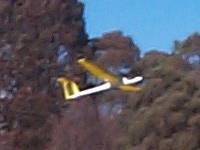Get Started in Quiet Flight! |
|
| Welcome to the exciting world of
"quiet flight"! Whether you're
interested in the peace and quiet of soaring with
the eagles, the exhilaration of speed and
aerobatics, or just the beauty of flight without
the mess and hassle of powered aircraft, quiet
flight has something to offer you! Quiet flight is the sport of flying radio-controlled electric powered planes and gliders. It involves three distinctly different styles of flying: electric powered planes, thermal soaring and slope soaring. |
 Electric powered Pilatus Porter |
 Albatross powered sailplane |
Within these areas many
different types of models are available -
including electric powered gliders, scale models,
indoor flyers, helicopters ...... the
possibilities are endless! And all models are
capable of performance greater than or similar to
glow powered models, but with less accessories to
pay for and much more reliability! Both electric aircraft and gliders are also the perfect first model. They are strong and easy to build, and they fly slowly, giving inexperienced pilots more time to react if they get into trouble. But there are other advantages. Such as: |
| The power/launching system is simple, easy to use and easy to maintain | |||
| It's excellent value for money | |||
| It's clean, convenient, reliable, different......and FUN! | |||
If you're interested in flying, but you haven't got the time or patience to build your own model, then try an "Almost Ready to Fly" (ARF) model. These are very popular, especially with beginners. Because of their extensive prefabrication, ARFs usually require only one or two evenings to assemble!
We strongly recommend that you learn to fly with an instructor using a buddy box radio. This allows you to connect your radio to your instructor's, using a cable. You'll still be the one controlling your model as long as your instructor holds down a switch on his transmitter. But if you get into trouble, all the instructor has to do is release the switch to take full control. CEFA has its own buddy box radio, so if you're interested in learning to fly let us know!
![]()
How do I get started?
If you're interested in having a go at radio-controlled
flying, it's a good idea to find out more about the hobby
before you spend any money. There are a number of books,
magazines and videos available that will be of great
help, so visit your local newsagent or model shop.
 Ian Parker shows his Spirit Elite to new member John Webster. |
You should also visit your local flying club. However be warned, you will probably be hooked on flying immediately and overwhelmed with help and advice! But the main reason for the visit should be to see what models come highly recommended by the local fliers (and just as importantly which ones to avoid!). Seeing how well a particular model flies might also influence your choice of model (and you might see your ideal second model too!) |
But first take a look around the rest of this website! The rest of this section is devoted to radio-controlled flying in general. We'll start with explaining what you'll need to buy to get into R/C flying, how to choose your first kit and radio. The next three sections contain detailed information specific to electric flight, thermal soaring and slope soaring. Each section covers any extras you'll need to buy and provides tips for flying your model, and we'll also look at some of the exciting possibilities each type of flying has to offer. Whatever your interests are, there's bound to be something on this website that captures your imagination!
![]()
| Introduction
| Electric
Flight | Thermal Soaring | Slope Soaring Introduction: Welcome | What you'll Need | Your first Model | Radio Systems |